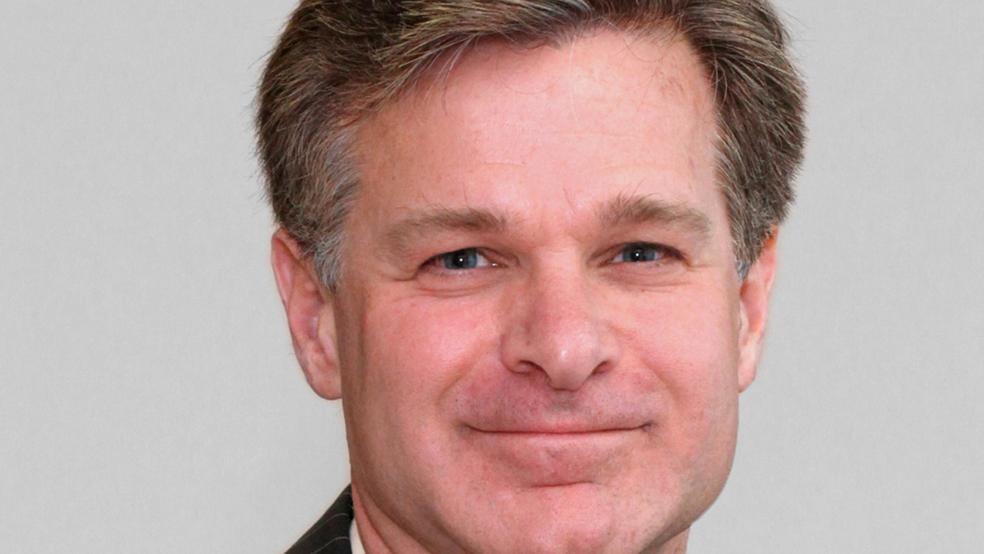NEW YORK (Reuters) - President Donald Trump's pick for FBI chief, corporate lawyer Christopher Wray, would likely face conflicts of interest at the agency due to his defense work for many big companies and be forced to step aside from some investigations, legal ethics experts said on Wednesday.
While he spent many years as a government attorney earlier in his career, Wray for the past 12 years has been a white- collar defense lawyer with the Atlanta-based firm of King & Spalding and is currently head of its government investigations practice."If there are investigations of a client he'd need to recuse himself," Steven Lubet, a legal ethics professor at Northwestern University, said.At the firm, Wray, a graduate of Yale University and its law school, defended Johnson & Johnson's Janssen Pharmaceutical unit in a Justice Department probe over off-label use of anti-psychotic drug Risperdal. He also represented Credit Suisse [CSAG.UL] in a major tax prosecution by the Justice Department, which alleged the Swiss financial group helped clients hide offshore accounts from the Internal Revenue Service. According to King & Spalding's website, clients of the practice led by Wray include AT&T, Deutsche Bank, CVS Caremark, General Motors, Wells Fargo and others. It was not clear if Wray personally represented all of the companies listed. Kathleen Clark, a professor at Washington University School of law, said professional ethics rules would specifically bar Wray as Federal Bureau of Investigation director from participating in investigations of former clients who shared confidential information with him. In addition, she said, federal regulations would prohibit him from participating in matters opposite King & Spalding for up to two years, though the government can waive those restrictions. Wray would not be the first FBI director to come from the private sector. But he served longer in private practice and has a more extensive corporate client base than other FBI chiefs. James Comey, the man whom Wray would replace, worked as an in-house lawyer for Lockheed Martin and hedge fund group Bridgewater Associates before he became FBI head in 2013. Robert Mueller briefly worked at two law firms between longer stints in government service before becoming FBI director in 2001.Mueller's conflicts from his post-FBI law career emerged as an issue last month after he was named special counsel to investigate ties between Trump's campaign team and Russia.Although the FBI is better known for its role fighting violent crime and espionage, the agency is charged with investigating corporate and securities fraud. In recent years, the bureau has launched probes against corporations including GlaxoSmithKline and Takata Corp, which resulted in billions of dollars in criminal penalties.Neither Wray nor King & Spalding responded to requests for comment on potential conflicts. The FBI referred a call on the matter to the Justice Department, which did not respond.Wray served as a federal prosecutor in Atlanta from 1997 to 2001. He then moved to the U.S. Department of Justice, where he eventually became assistant attorney general and head of the criminal division, where he oversaw the fraud investigation of Enron. He joined King & Spalding in 2005.DEPUTY DIRECTOR COULD STEP IN Wray represented New Jersey Governor Chris Christie, who at one time led Trump's presidential transition, in the Bridgegate scandal. In addition, King & Spalding partner Bobby Burchfield is serving as the ethics adviser for the trust set up in January to isolate the president from the day-to-day operations of Trump businesses.Burchfield praised his partner as having the "highest integrity" and said he saw no conflict between his own work and Wray serving as FBI director.Lubet said he did not think Wray's conflicts would present an "unsolvable" problem if he becomes FBI director. He noted that investigations could proceed at the field level without the issue arising. "Most decisions are not made at the director level," he said.In the event the director has to recuse himself, "that's what deputy directors are for," said Lubet. (Reporting by Anthony Lin; Editing by Cynthia Osterman)Trump FBI nominee's corporate legal work could exclude him from some probes

HANDOUT



